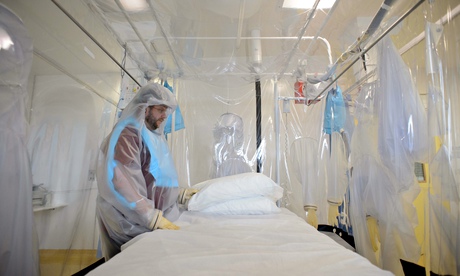British national who contracted deadly virus in Sierra Leone
is on RAF flight back to UK

A nurse wearing protective clothing demonstrates the facilities in place at the Royal Free Hospital in London, in preparation for any patients testing positive for the Ebola virus. Photograph: Leon Neal/AFP/Getty Images
A British healthcare worker who has tested positive for the Ebola virus in Sierra Leone is being evacuated to the UK on a Royal Air Force plane.
The Department of Health said the man is "not currently seriously unwell" and will be flown to RAF Northolt before being brought to the Royal Free Hospital in London, which is specially equipped with an isolation unit where he can be treated.
The man, who lives in Sierra Leone, is the first Briton confirmed to have contracted the disease. The decision to fly him home was taken at a meeting on Saturday morning involving the medical director of the NHS, Sir Bruce Keogh, the health secretary, Jeremy Hunt, and the foreign secretary, Philip Hammond. A medical assessment was then carried out on the patient to see whether he was fit to fly.
"The patient is not currently seriously unwell and is being medically evacuated in a specially equipped C17 Royal Air Force plane to RAF Northolt in the UK. Upon arrival in the UK, the patient will be transported to an isolation unit at the Royal Free London NHS Foundation Trust," a statement from the Department of Health said.
Prof John Watson, the deputy chief medical officer, reassured the public that the risk to the general population remained low.
"We have robust, well-developed and well-tested NHS systems for managing unusual infectious diseases when they arise, supported by a wide range of experts," he said.
"UK hospitals have a proven record of dealing with imported infectious diseases and this patient will be isolated and will receive the best care possible."
Dr Paul Cosford, the director for health protection at Public Health England, said protective measures will be maintained to minimise the risk of transmission of the virus. "For Ebola to be transmitted from one person to another contact with blood or other body fluids is needed and as such, the risk to the general population remains very low," he said.
The RAF flight took off from Freetown Lungi airport. "I saw it [the plane] sitting there for more than one hour but it has just taken off now. Some doctors assisted the man onboard and they've just come back now," an airport official said.
The restricted site at the Royal Free Hospital in Hampstead where the healthcare worker will be treated is equipped with specialist equipment to help contain the infection. The bed will be surrounded by a specially-designed tent with its own controlled ventilation system and the patient will be admitted through a specific hospital entrance. Waste is decontaminated and there is a dedicated laboratory to carry out tests. All the air leaving the unit is cleaned to minimise risk to anyone at the hospital, the hospital said.
Tom Donnatt, founder of the British charity Street Child which works in Sierra Leone and West Point in Liberia, said the spread of Ebola had spiralled from a health emergency into a "humanitarian disaster".
He said West Point was "a tense, grim, impoverished slum at any time" and is now entirely barricaded.
"They are now totally cut off from the world with uncertain access to food and water – and a terrifying disease from which they do not fully understand how to protect themselves," he said.
Last week, Medecins sans Frontier said that the international community was paying "almost zero" interest to the growing health crisis.
Source: http://www.theguardian.com/

No comments:
Post a Comment